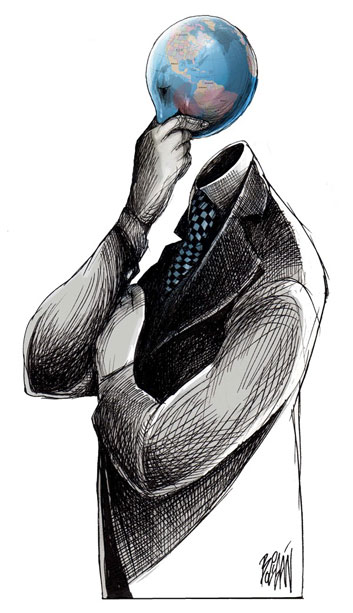
If we want to change the world, we have to focus on results and not feelings
With a fury reminiscent of Hurricane Katrina, Typhoon Lionrock savaged northeast Asia two weeks ago, unleashing floods that left 100,000 North Koreans homeless and more than half a million without water. The devastation was so extraordinary that the North Korean government responded in a way equally unprecedented --- by turning to the West for help.
I confess that my initial reaction was smug satisfaction. Thereís something providential about a rogue nation responsible for instigating so much strife and apprehension around the world coming hat-in-hand to beg for international aid and succor.
However, after a momentís reflection my feelings of moral superiority evaporated instantaneously. The victims here are not corrupt government nabobs; rather, they are the self-same people already victimized by the congenital corruption of their rulers. Even if the Orwellian tactics of the Kim dynasty have successfully hypnotized and lobotomized the people of North Korea into abject reverence, those hapless people hardly deserve the added suffering and indignation of a world denying them aid because of the sins of their overlords.
Divine justice will have to wait a bit longer.
To complicate matters further, just last week North Korea conducted yet another nuclear test in violation of its already-violated non-proliferation treaty. And so, with the UN blustering about increased sanctions and South Korea preparing for ďthe worst-case scenario,Ē humanitarian organizations are grappling with the logical and logistical problems of aiding the unfortunate citizens of a terrorist nation without helping the nation itself.
NO REST FOR THE WICKED
Of course, this is hardly a new dilemma. For decades, the terror organization Hamas has used propaganda and coercion tactics to exploit the Arabs of Gaza, Judea, and Samaria in a campaign to destroy the state of Israel and its Jewish population.
Consider the case of Wafa al-Biri, the 21-year-old Palestinian burn victim treated by Israeli doctors, who was then recruited to blow up the clinic that saved her. (She was apprehended before she could detonate the bomb.) Or the Palestinian mother who hoped that her baby -- after receiving a bone marrow transplant from an Israeli doctor -- would grow up to become a martyr. Or the Gazan children used as human shields and for building terror tunnels into Israel.
A few courageous Gazans have spoken out, but most are afraid of retribution against themselves or their families. The tragedy of Mideast bloodshed is multiplied by the number of Palestinian Arabs who want to live in peace with Israel but have no power and no voice to confront the culture of violence in which they live.
And yet, despite all this, the international community continues to supply the Palestinian Authority with billions in aid, the lionís share of which goes into the pockets of corrupt officials and to sponsor terror against Israel. The reasoning -- presumably -- is that the people of Gaza should not suffer because the leaders of Gaza are corrupt.
Thatís true, of course, just as it is in North Korea. But itís true only in principle, not in practice. If there is no oversight and no accountability, then what good comes from all those billions? Indeed, where is the common-sense recognition that the plight of the oppressed will never be relieved by donating money without ensuring that the money reaches the people it is intended to help in a form that actually helps them?
AN INVESTMENT IN GOOD FEELINGS
Like so many other policies and programs, the sole beneficiaries of international aid are often the givers, who can feel good about themselves and their generosity. True charity demands the sacrifice not only of dollars (or euros) but also the planning and implementation necessary for suffering, poverty, hunger, and oppression to be alleviated, not intensified -- no matter how well-intentioned the donations may be.
King Solomon warns us that, Like clouds and wind with no rain, so is a man who boasts with false gifts. Charity given without concern for its effect is worse than no gift at all, for it raises in vain the hopes of the needy while placating the conscience of the giver:
So how do we truly help the suffering people of North Korea? How do we free the oppressed people of Gaza? How do we enable the poor children of the inner-cities to break the cycle of poverty and violence that defines their lives?
What we should have learned by now is that more money is not the solution, any more than megadoses of antibiotics will prove effective against a non-bacterial virus.
We canít address any problem until we identify its root. We need to honestly acknowledge that the causes of suffering donít always conform to the glib soundbites of headline news, then creatively search out ways to help people help themselves.
More than anything what we need is leadership. We need those who aspire to and hold power to care more about accomplishing what needs to be done than they care about advancing their own ideologies, feathering their own nests, or making their supporters feel good by creating an illusion of achievement where nothing has been achieved.
We can't pretend to solve the problems of the world any more. We have to actually start solving them before the world disintegrates around us.
Rabbi Yonason Goldson is a professional speaker and trainer.† Drawing upon his experiences as a hitchhiker, circumnavigator, newspaper columnist, high school teacher, and talmudic scholar, he teaches practical strategies for enhancing communication, ethical conduct, and personal achievement. He is the author of Proverbial Beauty: Secrets for Success and Happiness from the Wisdom of the Ages is available on Amazon.
Comment by clicking here.


 Contact The Editor
Contact The Editor
 Articles By This Author
Articles By This Author
